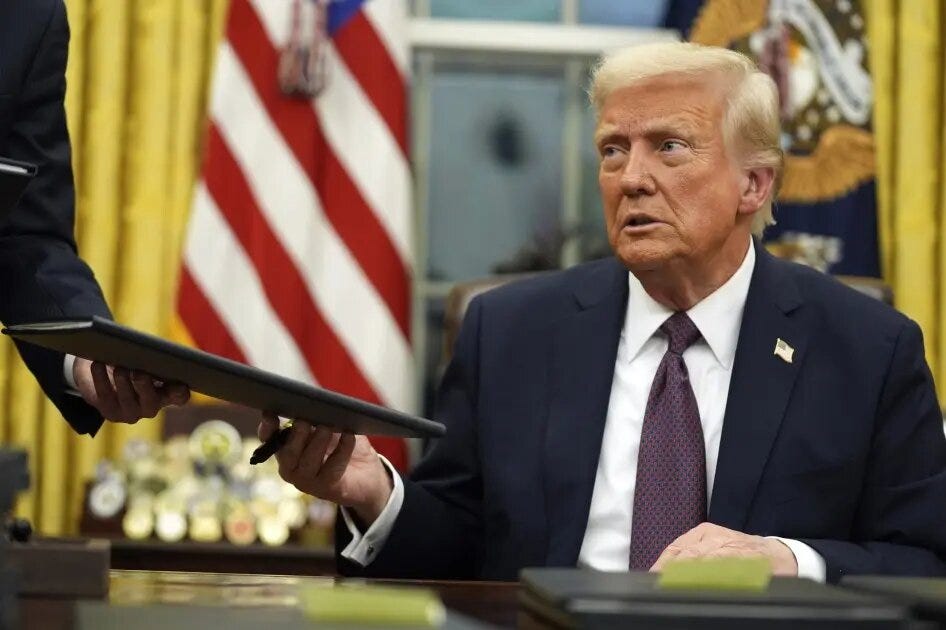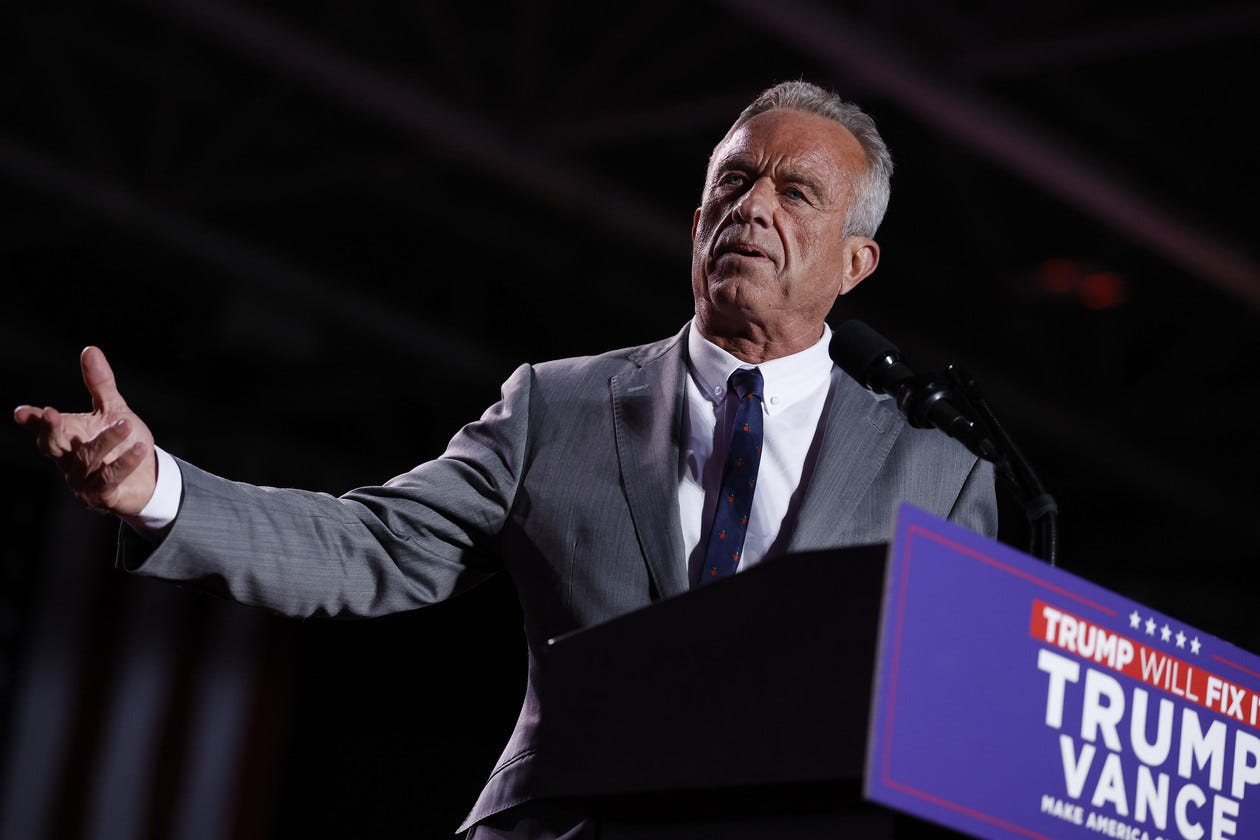Trump’s Eleventh Week: Mass Lawsuits, Trade Wars, and Immigration Crackdowns Continue
As Trump’s second term continues, legal battles mount over immigration, voting rights, and public health, while sweeping tariffs shake global trade.
The eleventh week of Trump’s second term has sparked further backlash as the president launched a global trade war. On Wednesday, Trump announced a baseline 10% tariff on all U.S. imports—the highest since the 1800s. The stock market declined globally following the announcement, raising fears of a recession. A previous report from The Introspective detailed earlier tariffs on all foreign-made automobiles.
Meanwhile, immigration policies under the Trump administration faced renewed controversy after a Maryland resident with protected status was deported to El Salvador due to an “administrative error.” Despite calls for his return, Trump officials maintain they cannot bring him back to the United States.
In a separate ruling, a federal judge blocked the administration’s attempt to end deportation relief for more than 350,000 Venezuelans living in the country, following Trump’s previous move to revoke protections for immigrants from Venezuela, Cuba, Haiti, and Nicaragua.
Trump’s efforts to downsize the federal government escalated this week as the Department of Health and Human Services fired every employee in a program that helped low-income Americans pay their energy bills. Meanwhile, Elon Musk, head of the Department of Government Efficiency (DOGE), is reportedly stepping down from his role in the coming months.
The Tariff War: “Liberation Day”
President Trump announced a baseline 10% tariff on all imports Wednesday, marking the highest tariffs since the 1800s and signaling the end of the free-trade era that has shaped global commerce.
“My fellow Americans, this is Liberation Day,” Trump said Wednesday.
“April 2, 2025, will forever be remembered as the day American industry was reborn, the day America's destiny was reclaimed, and the day we began to make America wealthy again.”
The tariffs will affect every nation the United States trades with. On April 9, additional “reciprocal” taxes—some as high as 54%—will be imposed on certain countries, including China.
“We will supercharge our domestic industrial base, we will pry open foreign markets, and we will break down foreign trade barriers,” Trump said.
Following the announcement, global leaders reacted swiftly. European Commission President Ursula von der Leyen called the tariffs a “major blow.”
“The universal tariffs announced by the U.S. are a major blow to businesses and consumers worldwide,” von der Leyen wrote in an X post.
“We're also ready to engage—and to go from confrontation to negotiation.”
In Asia, Al Jazeera reported that China’s Ministry of Commerce vowed to take “resolute countermeasures” to protect its economic interests.
“China urges the United States to immediately cancel its unilateral tariff measures and properly resolve differences with its trading partners through equal dialogue,” the ministry said.
Japanese officials also condemned the move. Yoji Muto, Japan’s minister of economy, trade, and industry, called the 24% tariffs imposed on the country “extremely regrettable.” His remarks followed a rare joint response from China, Japan, and South Korea, which united to counter Trump’s earlier tariffs on all foreign-made automobiles, despite historical tensions among the three nations.
“I have again strongly urged Washington not to apply these tariffs to Japan,” Muto said. Government spokesperson Yoshimasa Hayashi added that Japan is considering retaliatory tariffs but declined to disclose details.
The stock market reacted negatively to the announcement. The Standard & Poor’s 500 (S&P 500) dropped 3.3%, while the Dow Jones Industrial Average fell more than 1,000 points. In the U.K., the Financial Times Stock Exchange (FTSE 100) declined 1.5%. Stocks in Japan dropped nearly 3%, and Hong Kong’s market fell 1.5%.
“This was the worst-case scenario for tariffs and was not priced into the markets, which is why we are seeing such a risk-off reaction,” Mary Ann Bartels, chief investment strategist, told CNBC.
“The big question is if 5,500 can hold on the S&P 500. If it cannot, we may see another 5–10% downside, which could likely point to a bottom of 5,200–5,400.”
Many American business leaders voiced concerns about the tariffs. Michelle Korsmo, president and CEO of the National Restaurant Association, warned that they would hurt small business owners by increasing costs for food and packaging while pushing prices higher for consumers.
“Applying new tariffs at this scale will create change and disruption that restaurant operators will have to navigate to keep their businesses open,” Korsmo said in a press release.
“Many restaurant operators source as many domestic ingredients as they can, but it’s simply not possible for U.S. farmers and ranchers to produce the volumes needed to support consumer demand.”
However, others praised the tariffs as a historic shift in economic policy.
“Today is arguably the single greatest trade and economic policy action in the history of the country,” Nick Iacovella, president of the conservative group Coalition for a Prosperous America, told The New York Times.
“It absolutely cements President Trump’s legacy as he tries to usher in a new golden age of economic production and prosperity.”
Since the announcement, temporary layoffs have begun at auto assembly plants in Canada and Mexico, affecting more than 900 American employees.
Immigration Backlash Continues
As Trump’s crackdown on immigration continues, outrage has erupted following the deportation of Kilmar Armando Abrego Garcia, a Maryland resident from El Salvador who had protected legal status. The Trump administration later admitted the deportation was an “administrative error.”
“On March 15, although ICE was aware of his protection from removal to El Salvador, Abrego Garcia was removed because of an administrative error,” the administration stated in a court filing.
Abrego Garcia was arrested in Baltimore on March 12 after picking up his son, who has special needs. He was later transferred to El Salvador’s Terrorism Confinement Center (CECOT). A previous Introspective report highlighted allegations of abuse within Salvadoran prisons, where many deportees have been sent under an agreement with Salvadoran President Nayib Bukele.
“When they put him in the vehicle, they still took me to the vehicle, opened the door, and told me to say goodbye to him,” his wife, Jennifer, told NBC Washington.
“He just told me to take care of my kids. And I told him, ‘Everything is going to be fine. You’re going to come back because you haven’t done anything. You have your work permit.’”
Despite calls to bring Abrego Garcia back to the U.S., Trump officials said they could not do so because he was no longer in U.S. custody. His attorney, Simon Sandoval-Moshenberg, filed a new court petition Wednesday.
“Defendants have already washed their hands of Plaintiff, his U.S.-citizen wife, and his autistic, nonverbal, five-year-old U.S.-citizen child,” Sandoval-Moshenberg wrote in the filing, according to CNN.
“Defendants’ proposed resolution of this state of affairs, which they caused either intentionally or, at best, recklessly, is nothing at all. This is an outrageous set of facts.”
In an interview with CBS Baltimore, Sandoval-Moshenberg further criticized the administration, noting that the U.S. has corrected wrongful deportations in the past, even during Trump’s first term.
“I’ve handled several erroneous deportation cases, including under the first Trump administration. Every other time, as soon as I convinced them they had messed up, the Department of Justice and Department of Homeland Security bent over backwards to fix it,” he said.
“Right now, they haven’t taken a single step.”
Abrego Garcia entered the U.S. from El Salvador in 2011 and was granted protected status in 2019.
Meanwhile, following an Introspective report on Trump’s decision to revoke protections for immigrants from Venezuela, Cuba, Haiti, and Nicaragua, a federal judge temporarily blocked the administration from ending protections for more than 350,000 Venezuelans.
“The court finds that the secretary’s action threatens to inflict irreparable harm on hundreds of thousands of people, disrupt families and livelihoods, cost the U.S. billions in economic activity, and jeopardize public health and safety in communities nationwide,” wrote U.S. District Judge Edward Chen.
Chen criticized Secretary of Homeland Security Kristi Noem’s decision as “unprecedented.”
“Acting on the basis of a negative group stereotype and generalizing that stereotype to an entire group is the classic example of racism,” he wrote.
The Temporary Protected Status (TPS) program, established by Congress in 1990, was originally set to end on April 7 before the ruling.
Civil Rights and Public Health
Following a previous report from The Introspective highlighting an executive order requiring proof of citizenship for voting in federal elections, various civil rights groups, including the National Association for the Advancement of Colored People (NAACP) and the American Civil Liberties Union (ACLU), have filed lawsuits challenging the order.
In a joint statement, the groups—including the National League of Women Voters, NAACP, League of Women Voters of Arizona, League of Women Voters Education Fund, OCA - Asian Pacific American Advocates, Asian and Pacific Islander American Vote, and the Hispanic Federation—criticized the order. They are represented by the ACLU, ACLU of D.C., Brennan Center for Justice at NYU Law, the Legal Defense Fund, LatinoJustice PRLDEF, and Asian Americans Advancing Justice – AAJC.
“The president has no constitutional or statutory authority to unilaterally dictate how elections are run. This executive order is a blatant violation of the separation of powers. Election rules are decided by Congress and the states, and any attempt by the executive branch to override their power violates the Constitution,” the statement read.
“This order, based on a persistent false and racialized narrative, could disenfranchise millions of eligible voters. It mirrors the SAVE Act, which would add unnecessary barriers to voter registration and silence the voices of American citizens. These unlawful attacks on voting rights are part of a broader effort to undermine our democracy. We have filed suit to stop this executive order and to keep it from interfering with eligible voters' participation in our elections.”
The order directed the Election Assistance Commission (EAC), an independent federal agency, to require proof of citizenship to vote in order to prevent noncitizens from casting ballots amid growing anti-immigrant sentiment.
“Using this very racialized, very xenophobic fearmongering—it's really just a vehicle for voter suppression to justify imposing requirements that will silence a certain segment of the population,” said ACLU attorney Sophia Lin Lakin to ABC News.
The lawsuit names Trump and members of the EAC as defendants.
At the same time, more than 23 states, including Washington, D.C., have filed a lawsuit against the Department of Health and Human Services (HHS) and Health Secretary Robert F. Kennedy Jr. after the agency rescinded $12 billion in public health funding.
“The Trump administration’s illegal and irresponsible decision to claw back life-saving health funding is an attack on the well-being of millions of Americans,” New York Attorney General Letitia James said in a press release.
“Slashing this funding now will reverse our progress on the opioid crisis, throw our mental health systems into chaos, and leave hospitals struggling to care for patients.”
The lawsuit further alleges that the federal government failed to provide a “rational basis” for the cuts, claiming that states will be “at greater risk for future pandemics and the spread of otherwise preventable diseases” while also cutting off vital public health services.
A report from The Associated Press highlighted the impact on states such as Minnesota and North Carolina, where many public health workers have already been laid off as viruses like bird flu and measles spread.
“We are working now to figure out how much of this critical public health work we can save and continue,” Minnesota Health Commissioner Brook Cunningham said.
“The sudden and unexpected action from the federal government left us with no choice but to proceed with layoffs immediately.”
In North Carolina, officials estimate that the state could lose over $230 million in funding, bringing dysfunction to health departments, universities, and rural areas.
“There are legal ways to improve how tax dollars are used, but this wasn’t one of them,” North Carolina Attorney General Jeff Jackson said.
“Immediately halting critical health care programs across the state without legal authority isn’t just wrong—it puts lives at risk.”
In a statement released last Tuesday, HHS defended the cuts, referring to the funding as wasteful and citing the COVID-19 pandemic as an example.
“The COVID-19 pandemic is over, and HHS will no longer waste billions of taxpayer dollars responding to a non-existent pandemic that Americans moved on from years ago,” the agency said.
“HHS is prioritizing funding projects that will deliver on President Trump’s mandate to address our chronic disease epidemic and Make America Healthy Again.”
Meanwhile, states such as California are at risk of losing nearly $1 billion in funding, which would have been used for substance abuse prevention programs and vaccination efforts.
Federal Downsizing Continues and Elon Musk's Departure
With the president’s initiative to downsize the federal government underway, the HHS fired all employees within a program designed to help low-income Americans pay energy bills on Tuesday. This follows a previous report from The Introspective detailing mass layoffs at the agency, with more than 20,000 people losing their jobs.
“Every single federal staff member that worked on LIHEAP was let go,” said former employee Andrew Germain in an interview with The Hill, referring to the agency’s Low Income Home Energy Assistance Program (LIHEAP).
“So, there are no federal staff members left to work on the program.”
Prior to the layoffs, at least 15 people worked in the LIHEAP program.
Meanwhile, Elon Musk, head of the Department of Government Efficiency (DOGE), will step down from his government role in May. He had been designated as a “special government employee”—a temporary position capped at 130 days.
Musk initially denied the reports, dismissing them in an X post as “fake news.”
However, in an interview with Fox News, Vice President JD Vance confirmed that Musk was leaving but stated that he would remain “a friend and advisor” to both Vance and President Trump.
“Elon came in, and we said, ‘We need you to make government more efficient, we need you to shrink the incredible fat bureaucracy that thwarts the will of the American people but also costs way too much money,’” Vance said.
“We said, ‘That’s going to take about six months,’ and that’s what Elon signed up for. But of course, he’s going to continue to be an adviser. And by the way, the work of DOGE is not even close to done. The work of Elon is not even close to done.”
Despite Musk’s departure, DOGE is expected to operate until 2026.









Thanks for putting this all together!